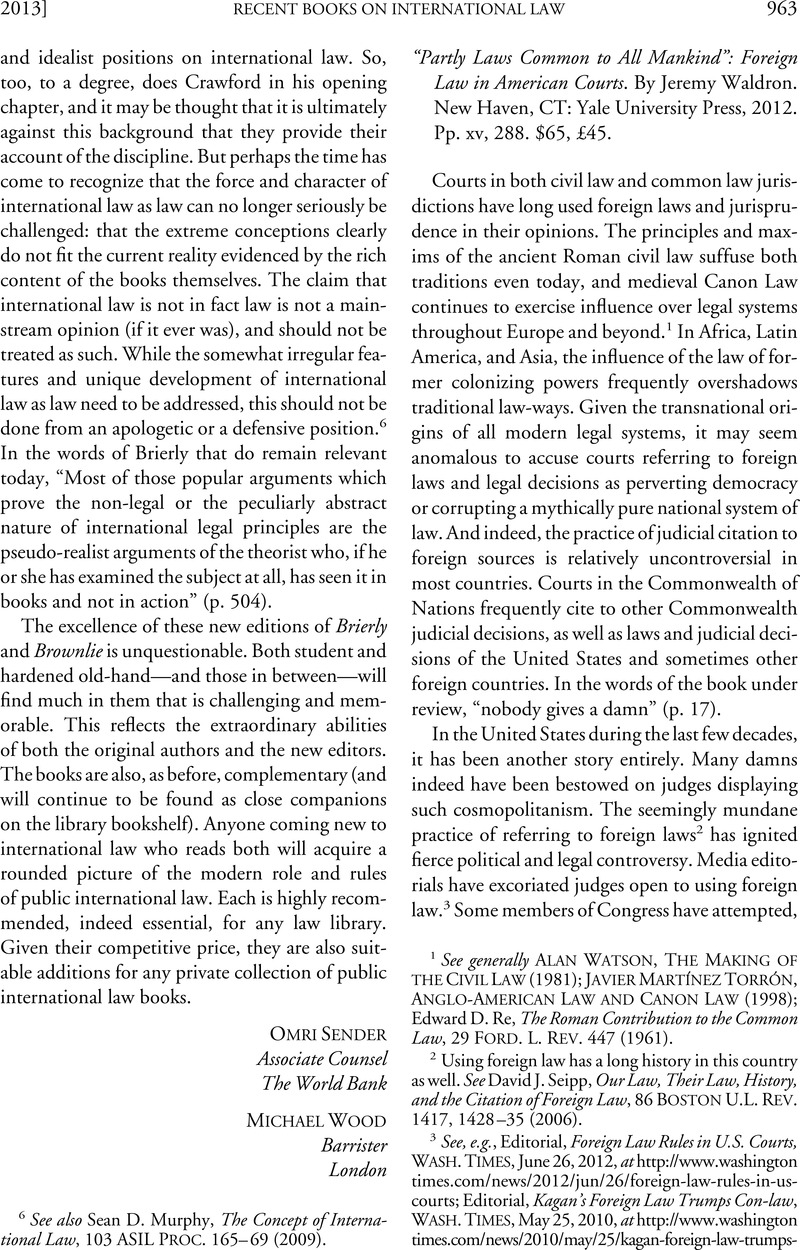Published online by Cambridge University Press: 20 January 2017

1 See generally Watson, Alan, The Making of the Civillaw (1981)Google Scholar; Javier Martíinez Torrón, Anglo-American Law and Canon Law (1998); Re, Edward D., The Roman Contribution to the Common Law, 29 Ford. L. Rev. 447 (1961)Google Scholar.
2 Using foreign law has a long history in this country as well.See Seipp, David J., Our Law, Their Law, History, and the Citation of Foreign Law, 86 Boston U.L. Rev. 1417, 1428–35 (2006)Google Scholar.
3 See, e.g., Editorial, Foreign Law Rules in U.S. Courts, Wash. Times, June 26, 2012, at http://www.washington times.com/news/2012/jun/26/foreign-law-rules-in-us-courts; Editorial, Kagan’s Foreign Law Trumps Con-law, Wash. Times, May 25, 2010, at http://www.washingtontimes.com/news/2010/may/25/kagan-foreign-law-trumps-con-law; Peter Brown, Editorial, Court Rulings Best Made-in-U.S.A., Orlando Sentinel, Aug. 26, 2005, at A 18; Posner, Richard, No Thanks, We Already Have Our Own Laws, Legal Aff., July/Aug. 2004, at http://www.legalaffairs.org/issues/July-August-2004/feature_posner_julaug04.msp.Google Scholar
4 Constitution Restoration Act, H.R. 3799, 108th Cong. (2d Sess. 2004); S. 520, 109th Cong. (1st Sess. 2005).
5 See, e.g., Dorsen, Norman, The Relevance of Foreign Legal Materials in U.S. Constitutional Cases: A Conversation Between Justice Antonin Scalia and Justice Stephen Breyer, 3 Int’l J. Const. L. 519 (2005)Google Scholar; Kornblut, Anne E., Justice Ginsburg Backs Value of Foreign Law, N.Y. Times, Apr. 2, 2005, at http://www.nytimes.com/2005/04/02/politics/02ginsburg.html.Google Scholar
6 See generally Fellmeth, Aaron X., U.S. State Legislation to Exclude International Law and Foreign Laws from the Courts, 106 AJIL 107 (2012)CrossRefGoogle Scholar.
7 See, e.g., Constitutional Relevance of Foreign Court Decisions: Debate Between Antonin Scalia and Stephen Breyer (Jan. 13, 2005), at http://www.free republic.com/focus/news/1352357/posts; O’Connor, Sandra Day, Keynote Address, 96 ASIL Proc. 348 (2006)Google Scholar; Ruth Bader Ginsburg, “A Decent Respect to the Opinions of [Human]kind”: The Value of a Comparative Perspective in Constitutional Adjudication (Feb. 7, 2006), at http://www.supremecourt.gov/publicinfo/speeches/viewspeeches.aspx?Filename=sp_02-07b-06.html.
8 The book was awarded a Certificate of Merit for a Preeminent Contribution to Creative Scholarship by the American Society of International Law in 2013.
9 543 U.S. 551 (2005).
10 [Editor’s note: To reflect Waldron’s spelling in the book, iuris and ius are spelled here with an initial i.]
11 See Fellmeth, Aaron X. & Horwitz, Maurice, Guide to Latin in International Law 155 (2009)CrossRefGoogle Scholar.
12 Waldron, Jeremy, Foreign Law and the Modern Ius Gentium, 119 Harv. L. Rev. 129 (2005)Google Scholar.
13 Waldron denies that the supposedly universal principles he claims exist are moral laws (pp. 64–65). To the extent that these principles merely reflect the necessities of any functioning institution, they are indeed pragmatic and need not be based on any specific moral system. However, Waldron’s argument extends beyond practicalities into principles of justice and equity, which brings them much closer to natural law theory than Waldron seems prepared to admit.
14 Waldronis using the term “law of nations”as a synonym for his ius gentium rather than its traditional meaning of international law. His interpretation is based on what I consider a basic misunderstanding of certain provisions of the U.S. Constitution and the Alien Tort Statute.
15 Ronald Dworkin, Taking Rights Seriously 22–31 (1977). Dworkin defines as a “principle” a “standard to be observed, not because it will advance or secure an economic, political, or social situation deemed desirable, but because it is a requirement of justice or fairness or some other dimension of morality.” Id. at 22.
16 Id. at 24–27.
17 See Dorsen, supra note 5.
18 Technically, Waldron is trying to look beyond human rights treaties; the book nowhere mentions customary international human rights law.
19 See, e.g., Posner, Richard, Foreword: A Political Court, 119 Harv. L. Rev. 31 (2005)Google Scholar.
20 Waldron’s argument here contradicts the iura novit curia principle, which would ironically seem to fall within the scope of Waldron’s own ius gentium.
21 See Green, Leslie, Legal Positivism, in Stanford Encyclopedia of Philosophy (Zalta, Edward N. ed., Fall 2009)Google Scholar.
22 Kelsen ultimately concluded that the basic norm was that states ought to behave as they have customarily behaved, Hans Kelsen, Principles of Public International Law 94–98 (1952), but this is obviously an impossibility. Such a norm, if it is not to be tautological, would deny the reality of change in law.
23 Hart, H.L.A., The Concept of Law 417–19 (2d ed. 1994)Google Scholar.
24 See, e.g., Bronislaw Malinowski, Crimeand Custom in Savage Society (1926); Karl N. Llewellyn & E. Adamson Hoebel, The Cheyenne Way: Conflict and Case Law in Primitive Jurisprudence (1941); Leopold Pospisil, The Ethnology of Law (1978).
25 See, e.g., Harding, Sarah K., Comparative Reasoning and Judicial Review, 28 Yale J. Int’l L. 409 (2003)Google Scholar; The Oxford Handbook of Comparative Law 869–1396 (Reimann, Mathias & Zimmermann, Reinhard eds., 2006)CrossRefGoogle Scholar.
26 On some aspects of this point, see generally Lawrence Lessig, Republic, Lost (2011). One scholar has shown that a famous athlete, musician, or actor testifying before the U.S. Congress on a policy topic is more likely to influence legislation than a qualified expert. See generally Demaine, Linda, Navigating Policy by the Stars: The Influence of Celebrity Entertainers on Federal Lawmaking, 25 J.L. & Pol. 83 (2009)Google Scholar.
27 Bin Cheng, General Principles of Law As Applied by International Courts and Tribunals (1953).
28 See, e.g., Holbrook, Timothy R., Should Foreign Patent Law Matter?, 34 Campbell L. Rev. 581 (2012)Google Scholar.